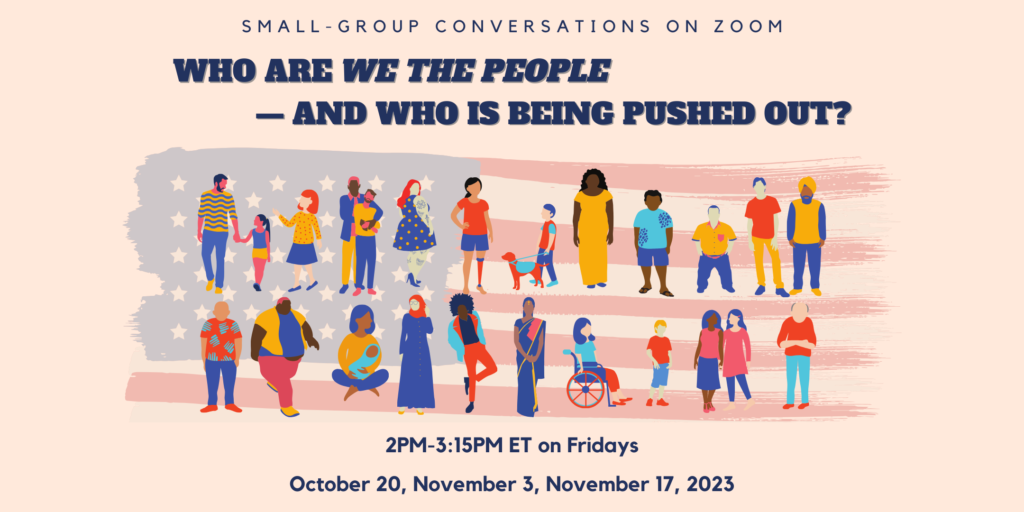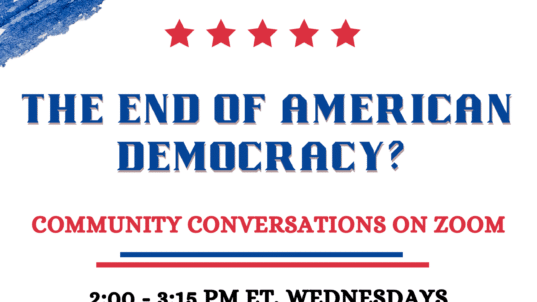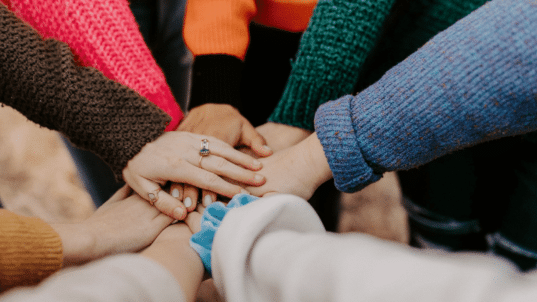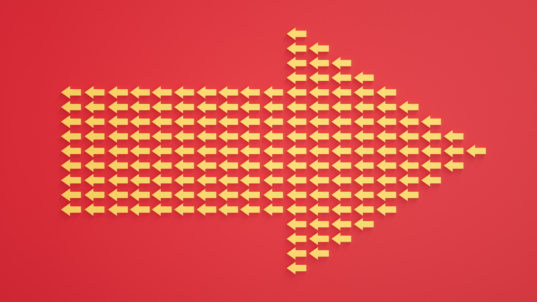
Who belongs in our democracy? When we say, “We the People,” do we mean all the people? Who is being excluded–and how? These are some of the questions we started to our explore in the first session of this three-part community conversation series. Below you’ll find a discussion summary of the key points that emerged from our conversations.
We want to include you too! Please join us online via Zoom for the next two interactive, small-group conversations to continue this collaborative exploration.
November 3, 2023 (2:00 pm – 3:15 pm ET): How might we expand our view of who is being excluded from our democracy? How do various forces exclude people and how does this affect our democracy?
November 17, 2023 (2:00 pm – 3:15 pm ET): What’s your vision of a democracy for all? How can we get there?
You can register for the remaining two sessions by completing the Eventbrite form below (scroll down in the form as needed) or use this link (feel free to share with others–it’s free!).
var exampleCallback = function() {
console.log('Order complete!');
};
window.EBWidgets.createWidget({
// Required
widgetType: 'checkout',
eventId: '721038805477',
iframeContainerId: 'eventbrite-widget-container-721038805477',
// Optional
iframeContainerHeight: 425, // Widget height in pixels. Defaults to a minimum of 425px if not provided
onOrderComplete: exampleCallback // Method called when an order has successfully completed
});
What does it look or feel like to be fully included in our democracy?
- You feel you belong, that you are taken seriously, that your voice is heard and valued without fear of retaliation
- Trust is essential for a feeling of belonging
- You feel welcome and safe, like psychological and physical safety is a priority
- You have a sense of sharing the same values with others
- It feels like everyone has the same rights to participate fully in society
- You are included in the group’s activities—and are respected for how you want to participate
- Tolerance is a starting point, where everyone is treated with dignity and respect
- There’s positive action to draw people in, seeking out those who have been marginalized: inclusion is more than just eliminating barriers
- You feel the most included when you’re not seen as unusual for being different, but just part of the broad mix of the community (mixed groups can seem the most welcoming because everyone is different in some way, so everyone fits in)
- You have the time to engage in the community, to talk with your neighbors, and to inform yourself about community matters
- You have access to trusted and truthful information to make informed decisions about public matters
- There’s a mutuality between current citizens and immigrants (potential new citizens), where current citizens have an open mind and make an effort to understand immigrants, and newcomers likewise work to understand and adapt to their adopted home
Aspects of an inclusive, representative democracy
- People have equal access to participate in public decisions, including equal access to voting, regardless of their identities (racial, ethnic, etc.)—and that equal access corrects the historical exclusion of certain groups from democratic participation
- People have equal access to the information they need, and at a level they can understand, to allow them to participate in public decision-making
- People can choose representatives who truly represent their beliefs
- People have equal representation in government (e.g., non-gerrymandered districts), and the government looks and sounds like the whole of the nation
- Citizenship is a form of inclusion
Who is being excluded—and how?
- People who were not initially included when the founding fathers said “we the people” are still the ones being excluded from full and equal participation in our society today (non-Whites, non-Christians, non-male, etc.)
- We have a long history of exclusion of various parts of our population, and we are still dealing with this legacy
- There is a history of cultural trauma that comes from exclusion and that is passed down from generation to generation
- We built our systems for a dominant identity that is assumed as the default, so when you don’t fit that, you experience exclusion
- Sex, gender identity, and sexuality are used to exclude people from full and equal participation in our society
- Women have been, and continue to be excluded
- Members of the LGBTQ community are being denied equal rights and, in many cases, threatened in their basic right to exist in our society
- Race, ethnicity, national origin, and religion are used to exclude people from full and equal participation in our society
- Language can work as a force of exclusion (we are a society of many languages, but operate as if we have only one)
- Lack of education, and lack of access to information at a level people can understand, can work to exclude them
- We exclude people when we don’t accurately include them in the telling and teaching of our history
- In educational contexts, some people are concealing or rewriting history to avoid uncomfortable truths of how we have mistreated different groups
- Immigration status and an complicated immigration system work to exclude people from full and equal participation in our society
- Undocumented migrants are excluded as they live in constant fear, despite the ways they positively contribute to their communities
- Refugees and asylees may have indeterminate status for decades, which keeps them from fully and freely participating in our society
- Involvement with the criminal justice system (being charged with a crime, convicted, imprisoned, etc.) is used to exclude people, even after they have exited the system (they’ve paid the penalty, served the time, etc.)
- Economic status and classism work to exclude people from full and equal participation
- Capitalism as the biggest threat to democracy: a system built to reflect the interests of wealth rather than people
- The lower your financial status, the less you are included (and vice versa)
- Without a living wage and the ability to meet your basic needs (housing, healthcare, etc.) you can’t participate fully in our democracy
- Lack of money means a lack of time to participate in the shared governance of our society
- Lower income and working-class people are excluded from equally participating in public decision making and face enormous barriers for running for political office
- Financial barriers can keep immigrants from winning full citizenship status
- Monopolies and economic consolidation shut down opportunities for economic participation
- Age works to exclude people, often at both ends of the spectrum
- Young people face barriers to participation in the life of their communities (e.g., barriers to voting) and are often left out of consideration in public decisions (especially as so many of our political leaders are very old)
- Older adults face barriers to participation, especially as their physical abilities change
- Health status and ability status, made worse by profiteering in the healthcare sector, can work to exclude people from full participation in our society
- Our systems make it difficult for people with disabilities to participate fully and freely
- Being neurodivergent and not conforming to people’s expectations for typical behavior, can work to exclude people
- Lack of physical and psychological safety works to exclude people from fully and freely participating in our society
- The sense of being unsafe can cross generations, as the impacts of the trauma of exclusion are passed down
- People can feel like they are living in invisible cages when they psychologically feel unsafe, especially when triggered by past traumas
- The erosion of the broader social contract with rampant individualism, everyone out for themselves alone, is a force of isolation and exclusion
- Bureaucratic complexity and difficult-to-navigate governing systems work to exclude people from full participation in our democracy
- Technology can lead to exclusion
- Social media algorithms can silence voices and isolate us from a diversity of opinions
- People retreating into virtual social networks instead of real, in-person networks, can lead to exclusion
- Escapism, which can take shape as addiction, despair, apathy, serves to exclude people
Some contributing factors and complications for exclusion
- Fear of losing power on the part of the dominant social group they hold on to that status by any means (restricting democratic participation by other groups, blocking the accurate teaching of history, banning books, etc.)
- This fear of losing power readily turns into anger at other groups, at any progress toward greater social equality, and a righteous zeal to uphold the status quo of inequality
- This anger and zeal to uphold inequality spreads by a kind of social contagion
- In response to this anger and zeal, people are hesitant to speak up against inequality, for fear of being harmed (derided as a pedophile, etc.)
- There’s a Catch-22 where marginalized groups have to be meek and not make waves in order to be included more fully in our democracy—but unless they speak up and make waves, they will continue to be ignored and excluded
- Xenophobia is a big contributor to exclusion
- Lack of shared cultural values to enable connections across cultures
Some initial possibilities to counter exclusion
- There needs to be a resistance movement against the forces acting for exclusion
- Encourage mindsets of openness to others and work to establish a greater sense of shared values and commonalities across groups or identities in our society
- Practice tolerance and encourage people to go out of their comfort zones
- Establish spaces where people are physically and psychologically safe
- Establish and communicate norms of openness to differences and welcoming newcomers
- Encourage and provide opportunities for intercultural connections and celebrations
- Make sure people have equal access to democratic participation (e.g., equal voting rights) and equitable political representation (one person, one vote—and the real possibility of having representatives who truly represent who you are)



